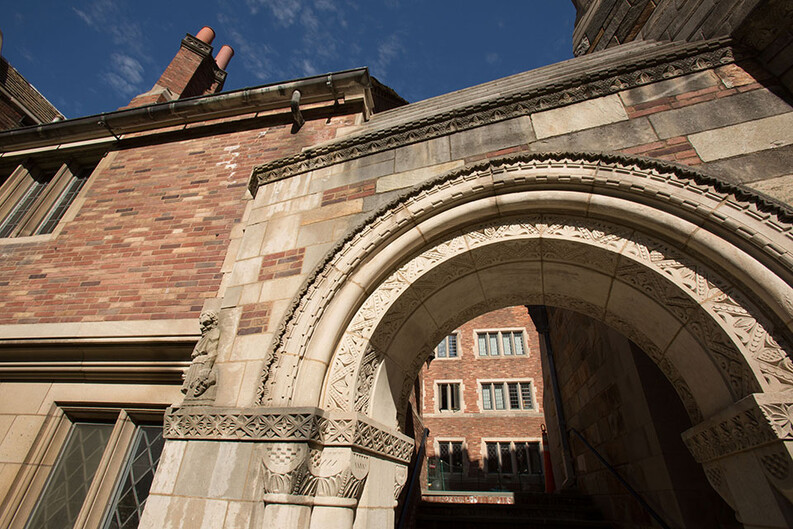EJ Clinic Advocates for Community in EPA Case

The Environmental Justice (EJ) Clinic at Yale Law School is representing community residents involved in a longstanding race discrimination complaint filed with the U.S. Environmental Protection Agency (EPA) that stems from the expansion of a Texas refinery near a largely African American community.
After years of ignoring the complaint, which clinic students said violated legal requirements for acting on civil rights complaints, the EPA recently settled the case with the Texas Commission on Environmental Quality (TCEQ). According to the students, however, EPA failed to consult with community members before reaching settlement and the community that has been adversely affected by pollution fro the refinery remains unsatisfied with the resolution and is pushing for further accountability.
The complaint, filed in 2000 by People Against Contaminated Environments (PACE), a Beaumont, TX community group, and the Sierra Club, accused TCEQ of approving a major expansion of an ExxonMobil refinery in violation of civil rights law. The EPA accepted the complaint in 2003 and under federal law had 180 days to issue a preliminary finding. The EPA failed to issue findings for well over a decade, according to students from the clinic, which now represents the complainants in this case along with Earthjustice and the Environmental Law Clinic at the University of Texas School of Law.
The clinic said that while the complaint sat unaddressed, community residents near the Beaumont refinery have been living with the refinery’s harmful effects, including unsafe toxic air pollution levels. The refinery is one of the ten largest in the U.S. and sits adjacent to an African American community that is also bombarded with pollution from a number of other large toxic air polluters, including the largest U.S. oil refinery, a chemical plant, and several other significant toxic air polluters nearby, according to the clinic.
Now, after a nearly 15-year delay, community members have been shut out of the process for addressing the issues they raised, and EPA and TCEQ issued an agreement requiring TCEQ to take only minimal steps, which community members say won’t begin to address the impacts of the expanded facility on their lives. The agreement requires TCEQ to place a single air quality monitor approximately one mile away from the facility and to hold two public meetings to discuss monitoring data, according to the clinic.
Neil Carman, Sierra Club Clean Air Program Director and former TCEQ inspector, said, “The meager requirements in this settlement and particularly the placement of an air quality monitor to capture levels of hydrogen sulfide – known for its ‘rotten egg’ smell and extremely corrosive nature – raise serious questions. The monitor’s distance from the polluting sources – more than twice as far as some homes – is likely to result in significant underreporting of toxic emissions, continuing to endanger the community’s health and well-being.” Carman noted that inaccurate readings will undermine complaints from the many community members who live between the monitor and the refinery.
Reverend Roy Malveaux, who was the executive director of PACE at the time of the 2000 EPA complaint against TCEQ, isn’t satisfied with the agreement’s terms. "People need to be informed about the type of chemicals that are being emitted into the neighborhoods – right now that’s not the case." But Malveaux’s resolve is still strong even after many years of waiting: “As long as they’re going to pollute we’re going to have to be vigilant.”
The EJ Clinic and Earthjustice also represent the Sierra Club as well a other community groups and organizations across the country in litigation seeking long-awaited justice for civil rights complaints that have similarly languished at EPA for years. That case is in federal court, with oral arguments before the court to take place this summer.
“It seems like EPA was rushing to reach agreement so that it could say to the court that it has now completed its investigations,” said Marianne Engelman-Lado, of the EJ Clinic at Yale Law School. “But after all of these years, we would have hoped that a government office charged with enforcing civil rights would conduct a thorough investigation and finally enforce the law, not just try to paper over its failure to meet deadlines.”
Kelly Haragan, Director of University of Texas’s Environmental Law Clinic, is skeptical that the two community meetings will address residents’ concerns. "The community asked for action to address its exposure to levels of pollution TCEQ acknowledged were unsafe. It didn't ask for meetings. EPA's unwillingness to work with the community to identify actions that would truly improve safety and quality of life in Charlton-Pollard is disappointing."
The EJ Clinic at Yale Law School takes on cases to address inequality in the distribution of health hazards as well as procedural inequities faced by community members seeking to assert their own vision for the future of their neighborhoods, towns, and cities.


